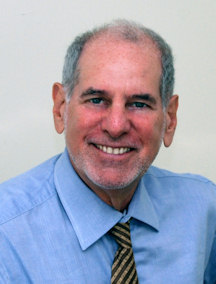Philip Uri Treisman

Philip Uri Treisman is a professor of mathematics and public affairs at the University of Texas at Austin and also the founder and executive director of the Charles A. Dana Center for Mathematics and Science Education, an organized research unit at The University of Texas at Austin. Treisman, who has been a pioneer in advocacy for mathematics education for more than 30 years, is often considered a “translation researcher”—one who translates research data into practices that have powerful effects in transforming educational outcomes.
Treisman began advocating for equality in education in his childhood as a mathematics tutor and member of a youth advocacy organization during the civil rights movement. He continued this advocacy with work in Central and East Los Angeles during his undergraduate years at the University of California at Los Angeles. Then, as a graduate student of mathematics at the University of California at Berkeley, he observed that many African-American and Latino students were not succeeding in freshman calculus, even though they had demonstrated sufficiently strong mathematics achievement in high school to qualify to enter a selective university.
To explore this phenomenon, he engaged in an intensive study of the academic and social lives of African American, Latino, and Asian students. Treisman discovered that, contrary to popular belief, the African-American students were not performing poorly due to a lack of motivation or preparation, but rather because of their social and academic isolation on campus.
Treisman learned the importance of deepening and intensifying students’ connections to their peers and instructors, and, more broadly, to campus resources. He found that well-grounded academic and social connections help students adapt to the university environment and provide them with an explicit mechanism for understanding what is expected of them by their instructors, their advisors, and the institution itself. This knowledge enables students to make better use of campus resources, and to better organize—and succeed in—their academic lives.
Treisman’s findings crystallized the importance of helping students learn to navigate the boundaries of the academic and social worlds of higher education. In particular, helping students to develop and “try on” identities as mathematicians, as academics, and as professionals increased their productive persistence in their studies and, he believed, shaped the way they made sense of the academic content they were studying.
To address these challenges, Treisman designed and developed, with collaborators, the Professional Development Program Mathematics Workshop at the University of California at Berkeley, which later became known as the Emerging Scholars Program (ESP) and by dozens of other local names. Adopted and replicated by hundreds of institutions of higher education, the “mathematics workshop” or the Treisman model is built on two core constructs: the creation of a collegial academic environment, supported by intensified academic instruction. Importantly, ESP was not designed as a remedial program but as an honors program focusing on academic excellence. Treisman’s ultimate goal was for students to be successful in calculus and in subsequent mathematics courses. Local research data as well as the persistence and graduation rates of ESP students bear out the early anecdotal evidence of the program’s efficacy. Treisman’s work on ESP was widely recognized—in particular, by a Charles A. Dana Award for Pioneering Achievement in American Higher Education and, in 1992, by a MacArthur Foundation Fellowship. The program’s fundamental insights have proven enduring and highly influential—not only for students in higher education, but also for those in K–12.
Treisman’s recent design work includes a program specifically designed to support students making a different transition—from middle school to high school. Treisman and Dana Center colleagues worked with researchers in developmental and social psychology, and with teachers and other education leaders in school districts around the country to develop the Academic Youth Development (AYD) family of programs. Created in collaboration with the Agile Mind, Inc., AYD translates the latest psychological and learning sciences research on student motivation, engagement, and learning into practical strategies and tools that can be enacted by teachers and students every day, in every classroom. AYD changes how students understand intelligence and their own ability to achieve. And AYD drives a cultural change in the classroom by instilling in students a willingness to share their ideas and to engage productively with their teacher and with other students.
Selected publications
Philip Uri Treisman and Stephanie A. Surles. (2001). "Systemic reform and minority student high achievement." In The right thing to do, the smart thing to do: Enhancing diversity in the health professions in honor of Herbert W. Nickens, M.D. (pp. 260-280). Washington, DC: Institute of Medicine, National Academy Press, National Academy of Sciences. Available on the NAP website.
Philip Uri Treisman and Edward J. Fuller. (2001). Comment on "Searching for indirect effects of statewide reforms." In Diane Ravitch (Ed.), Brookings papers on education policy: 2001 (pp. 208-218). Washington, DC: Brookings Institution.
Rose Asera and Uri Treisman. (1995). Routes to mathematics for African-American, Latino and Native American students in the 1990s: The educational trajectories of Summer Mathematics Institute participants. In Naomi D. Fisher, Harvey B. Keynes, and Phillip D. Wagreich (Eds.), Changing the culture: Mathematics in the research community; issues in mathematics education, Conference Board of Mathematical Sciences (pp. 127-150). Providence, RI: American Mathematical Society, Mathematical Association of America.
Uri Treisman. (1992). Studying students studying calculus: A look at the lives of minority mathematicians (pdf 1.5mb). A Mary P. Dolciani Lecture. College Mathematics Journal, 23, 362-372.
Robert E. Fullilove and Philip Uri Treisman. (1990). Mathematics achievement among African American undergraduates at the University of California, Berkeley: An evaluation of the Mathematics Workshop Program. Journal of Negro Education, 59, 463-478.